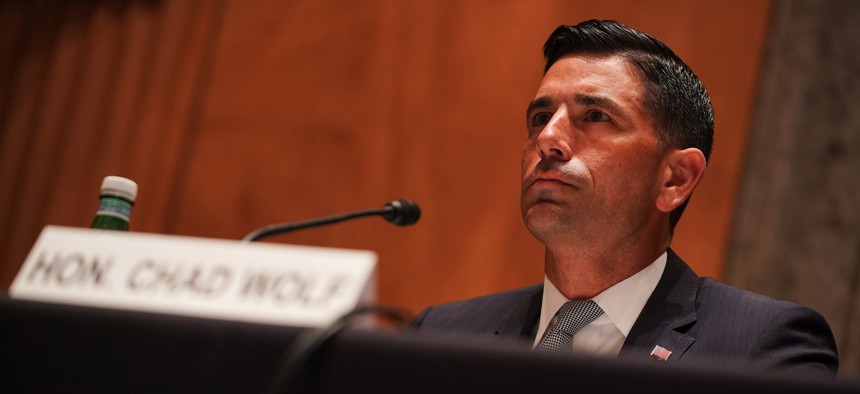DHS manipulated report on Russian election interference during the Trump administration, watchdog says

DHS Acting Secretary Chad Wolf testifies to Congress on September 23, 2020, in Washington, D.C. Greg Nash-Pool/Getty Images
A 2020 report to state and local governments was delayed and altered, a new IG report finds.
A top Trump administration official delayed and altered an intelligence product about the upcoming 2020 presidential election, leading to the perception that it was changed to help Donald Trump’s re-election bid, according to a federal watchdog.
On Tuesday, the Homeland Security Department’s inspector general office released the results of its investigation into a 2020 report by the department’s Office of Intelligence and Analysis about Russian interference in the presidential campaign. Entitled “DHS Actions Related to an I&A Intelligence Product Deviated from Standard Procedures,” the investigation’s results were released with a few redactions. It reflects reporting by ABC News from back in September 2020.
“The acting secretary participated in the review process multiple times despite lacking any formal role in reviewing the product, resulting in the delay of its dissemination on at least one occasion,” the IG document said. “The delays and deviation from [the Office of Intelligence and Analysis] standard process and requirements put [the office] at risk of creating a perception of politicization.”
In April 2020, analysts with DHS’s Cyber Mission Center began drafting a report titled, “Russia Likely to Denigrate Health of US Candidates to Influence 2020 Electoral Dynamics.” Aiming to inform state and local governments, the analysts followed the Office of Intelligence and Analysis’ drafting and editing policies, the IG found.
But when DHS leaders reviewed the report at a July 8, 2020, meeting, Acting Secretary Chad Wolf (who is referred to by his title but not explicitly named in the IG document) determined that DHS should hold the report because it would embarrass President Trump, according to a whistleblower complaint noted in the IG report.
The report was delayed for months. A Cyber Mission Center official added a “tone box”— a new section of text—that said China and Iran were trying to derail Trump’s re-election. When DHS investigators asked why the material outside of the original scope of the report was added, the official didn’t have a good answer.
“He told us it was a feature intended to draw a contrast between the actions of Russia and those of Iran and China, but also described the tone box as a ‘blunting feature’ meant to balance the product. When asked whether intelligence products require balancing, he said the addition of the tone box was not politicization, yet also said it showed [the Office of Intelligence and Analysis] political savviness, as the state and local customers of their products tended to be political,” the IG report said.
The Office of Intelligence and Analysis’ analytic ombudsman reviewed the July and September versions of the intelligence product and found problems with both, particularly the latter one. “The piece seems to almost avoid the main message that is made explicit in the key judgment––that Russian influence actors are targeting the Democratic candidates in 2020,” the ombudsman wrote.
The watchdog also determined that the Office of Intelligence and Analysis didn’t follow its own internal processes and requirements for editing and sharing the report. As a result, the IG made a recommendation on how the DHS Undersecretary for Intelligence and Analysis can shore up its process for election-related intelligence products, which DHS agreed with.
“Since January 2021, the [Office of Intelligence and Analysis] has renewed its commitment to continually assess the policies, guidelines and processes that govern the review and dissemination of its finished intelligence products, including to identity and implement and necessary improvements,” wrote John Cohen, senior official performing the duties of the under secretary for the office, to Joseph Cuffari, DHS inspector general, in a memo responding to the report.
In the methodology section, the IG office said Wolf requested an interview in writing rather than orally. Wolf was determined by the Government Accountability Office and several federal judges to have served illegally. Wolf called the rulings “meritless,” when he resigned in January 2021.
The watchdog’s account fits with a pattern of Trump administration officials who attempted to de-emphasize Russia’s efforts to interfere with the 2020 election. In September 2020, then-National Security Advisor Robert O’Brien claimed that China had taken the most active role in interfering in the 2020 election, but offered no details or examples of how.
In January 2021, Barry Zulauf, the analytic ombudsman in the Office of the Director of National Intelligence, told Congress that, as The New York Times put it: “Analysis on foreign election interference was delayed, distorted or obstructed out of concern over policymaker reactions or for political reasons.”
In March 2021, the Office of the Director of National Intelligence released its own report on Russia’s interference, adding that Kremlin-backed agents attempted to use people close to Donald Trump and Trump-friendly media to undermine his Democratic opponent. The report also concluded that while Iran had worked to interfere with the election, China—contrary to O’Brien’s public statements—decided it was too risky to do so.





